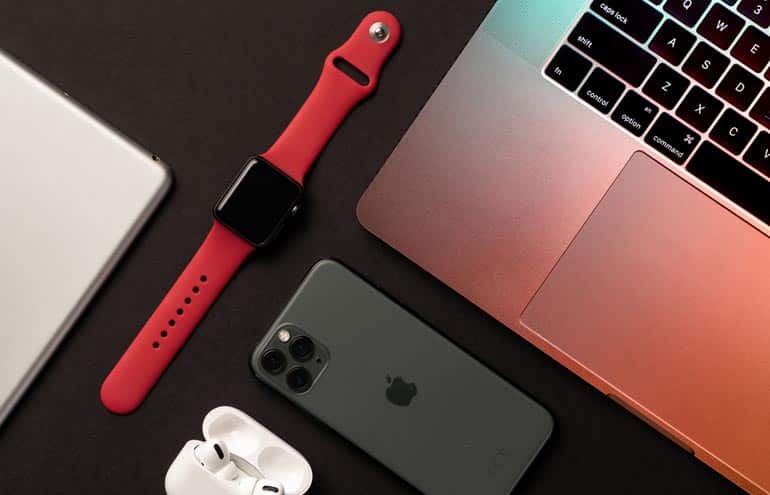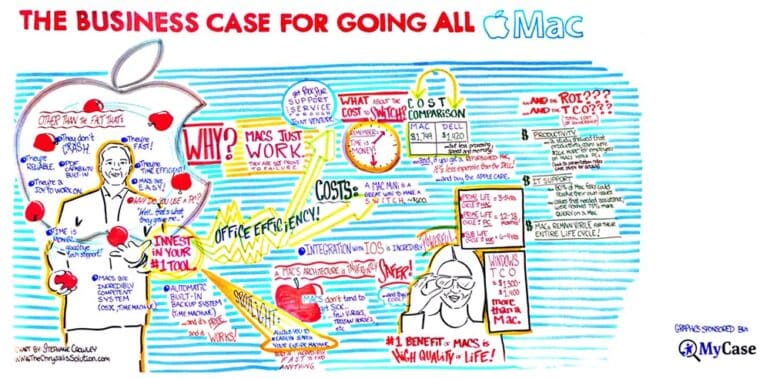Three years ago, I wrote a primer for Attorney at Work on setting up an all-Mac law office. For this new two-part series, in addition to updating that earlier article here, I’ve reached out to four Mac-using lawyers — Victor Medina, David Sparks, Ben Stevens and Jeremy Worley — for their insight and advice. You can read their full replies tomorrow on Attorney at Work.

Table of contents
- How Many Lawyers Are Using Macs?
- Which Mac Should You Buy?
- What About the Software I Need to Run My Practice?
- Juggling Microsoft Office and PDF Files
- Other Mac Software Lawyers Use
- Cloud-Based Services that Mac Lawyers Use
- Resources for Current and Future Mac Lawyers
- Lawyers Who Use Macs: Why They Do It and How
How Many Lawyers Are Using Macs?
There are two reasons lawyers contemplate using a Macintosh in their practice. One is because they’re already using an iPhone or iPad and a Mac would complete their Apple-y experience. (Some call this the “halo effect.”)
The second is that many lawyers have a Mac at home either for their own use or a family member’s (e.g., for offspring attending college). They’ve become enamored with the “it just works” dependability and yearn for the same experience on their work computer.
We’re not completely sure of the total number of Mac-using lawyers, but in the 2015 Legal Tech Survey conducted by the ABA’s Legal Technology Resource Center, 8.1 percent of respondents reported that they use a Mac in their practice. That’s a noteworthy jump from only 5.8 percent in the 2014 survey. The biggest chunk of those Mac users were solo practitioners (15.5 percent), and small firms (2-9 attorneys) were next.
Why solos and small firms? I suppose because they are more flexible in choosing the equipment they want to run their practice. Larger firms strictly limit what their lawyers use, although the stealthy invasion of BYOD is expanding beyond mobile devices to computers as well.
A completely separate survey by Clio asked 886 lawyers, paralegals and law students why they chose to use Macs instead of Windows PCs. Fifty-two percent of them simply reported that Macs were more reliable and secure. That’s the reason Jeremy Worley says he led his 13-attorney firm to switch from Windows to Macs — they wanted the most reliable machines they could buy, which would “pay for themselves in saved IT costs, time and energy.”
So why aren’t all lawyers using Macs? One reason may simply be that their firms won’t let them. Many midsize and large firms provide a computer for their lawyers and they’re certainly not giving out Macs.
But the main reason is still the lack of legal-specific, Mac-native software. Legal software developers can’t justify spending time and resources on a product that only 8 percent of their customer base would use.
Then there’s still the misguided perception that Macs cost more than Windows computers. The imaginary price gap, however, shrinks dramatically when you compare a Mac and a Windows computer with the exact same components. Sure, you can buy a $400 Windows laptop, but how long will it last? And why subject yourself to the persistent frustration of a low-powered cheap alternative when your computer is one of the most important pieces of equipment in your practice?

For additional insight, here’s a graphic, courtesy of MyCase, drawn during a 2014 ABA TECHSHOW session titled, “The Business Case for Going All Mac.” (Click the graphic to enlarge it.) ABA TECHSHOW features a full-day “Mac Track” for legal professionals looking to use a Mac in their practice.
Which Mac Should You Buy?
For a desktop, I still recommend the 27-inch iMac. (Go Retina 5K if you can but it’s not necessary.) You can still go for the Mac mini but you’ll need to supply your own keyboard, mouse and monitor. Consider a SuperDrive if you still need to access CDs and DVDs since no Mac today has an internal drive.
The laptop side has gotten a little confusing since my previous article. I still recommend that most folks look first to the 13-inch MacBook Air, but consider the 13- or 15-inch MacBook Pro if you want a Retina display. The MacBook Air boasts plenty of power for lawyers, but the Retina display on the MacBook Pro is truly dazzling.
In March 2015, an unusual new laptop entry hit the shelves simply called the “MacBook” with no additional descriptor. The 12-inch MacBook is thinner and lighter than the MacBook Air but boasts a Retina display. Based on reviews so far, you’ll either love it or hate it. The MacBook probably has the bare minimum of power I recommend for a lawyer, but most folks complain about the keyboard and the single connector (for power, USB and everything else).
The absolute best thing you can do is visit an Apple retail store and get your hands on all the models to see which works best for you. And if the price is still too scary, consider purchasing an Apple Certified Refurbished machine.
What About the Software I Need to Run My Practice?
Every Mac-using lawyer I interviewed expressed frustration with the lack of legal-specific software for the Mac. Some Mac lawyers will actually keep an old Windows computer running in the office just for one or two programs they need, but a more elegant solution is to run a virtual Windows environment on your Mac using Parallels or VMware Fusion. (Apple’s own Boot Camp is another option but that takes you completely out of the Mac environment.)
Ben Stevens uses Parallels to run “mission-critical” programs that are Windows-only (and not web-based) such as the South Carolina Child Support Guidelines. David Sparks has done the same to use CaseMap, but he says “putting Windows on your Mac is like putting your dad in a dress.”
The Mac operating system comes with built-in software for email, contacts and calendar. Some say these applications are consumer-focused, but many Mac-using lawyers find them extremely practical and flexible enough to fully suit their needs. The three applications can connect to almost any back-end found in a legal environment (e.g., iCloud, Google, Exchange).
For legal-specific, Mac-native software, I’m sticking with the three suggestions from my previous article:
- Daylite (business management)
- TimeNet Law (“firm management” suite with time entry, accounting and reporting)
- qd documents (document review software for litigation)
One addition to the list is DocMoto, which offers document and email management for law firms. Victor Medina says he has used the product for several years in his practice and finds it extremely valuable.
Juggling Microsoft Office and PDF Files
Every Mac-using lawyer should purchase Microsoft Office for Mac. While there are other software packages lawyers can use, including Apple’s Pages, Numbers and Keynote, you will save yourself unnecessary frustration by using the tool everyone else in the business world uses. Microsoft just released Office 2016, which includes Word, Excel, PowerPoint, Outlook and OneNote, as well as access to Microsoft’s OneDrive online storage service.
To purchase Microsoft Office for Mac, you’ll be well-served to obtain a subscription to Office 365, which will allow you to install the software locally on your Mac, as well as liberate the full functionality of Word, Excel and PowerPoint on your iPhone and iPad.
Every Mac-using lawyer should also invest in a fully-powered PDF software application. Mac OS X comes with Preview to view and annotate PDFs, but lawyers need the additional power that’s found in tools like Adobe Acrobat Pro or PDFpen Pro.
If you can afford a subscription for Adobe Acrobat Pro or “Adobe Document Cloud,” go that route. Personally, I get confused with Adobe’s pricing and frequent re-branding attempts, so I would suggest that lawyers look at PDFpen Pro, which costs much less and offers just about all of the same features.
Other Mac Software Lawyers Use
There are numerous non-legal software utilities and tools for Macs that lawyers can use. David Sparks says he uses these utilities to “run circles around opposing counsel” simply because the software is well-designed and allows him to get more done in less time.
The six utilities I mentioned in my previous article still hold strong:
- Hazel
- Alfred
- Circus Ponies Notebook
- TotalFinder
- HoudahSpot
- TextExpander
In fact, all four Mac-using lawyers I interviewed mentioned using TextExpander because it makes them more efficient.
I am adding 1Password to the list, too, for managing passwords and securing personal information. Originally designed only for the Mac, it can now work across your iOS devices and even Windows.
Cloud-Based Services that Mac Lawyers Use
More lawyers than ever can use a Mac in their practice today because so much of what they do can be done “in the cloud” — which means it doesn’t matter what computer or mobile device you use.
Here’s a short list of the cloud-based legal services I see Mac lawyers using today.
Practice Management:
- Rocket Matter
- Clio
- MyCase
- Amicus Cloud
- LexisNexis Firm Manager
- Firm Central
Time and Billing:
Document Management/Storage:
Litigation Support/Document Review:
Resources for Current and Future Mac Lawyers
For more information on using Macs in your law practice, I recommend following Ben Stevens’ The Mac Lawyer blog, the MacSparky blog from David Sparks, and my own Macs in Law blog.
If you want to converse and interact with over 4,600 other Mac-using lawyers and legal professionals, consider joining the MILO (Macs in Law Offices) Google Group.
Also, consider attending the annual MILOfest Conference, which this year is November 12-14 at Disney World in Orlando, as well as the “Mac Track” at ABA TECHSHOW 2016, March 17-19, in Chicago.
Lawyers Who Use Macs: Why They Do It and How
Mac for lawyers? Can you run a law firm with Apple Macs? A Q&A with 4 prolific and proficient Mac-using lawyers.
In Part One of this “all-Mac” series, “Still Want an All-Mac Law Office?,” we talked about what you need — hardware, software, cloud services and more — and how you can get your Mac law office going. For Part Two, I reached out to four of the most prolific and proficient Mac-using lawyers to ask how they run their practices on a Mac, so you can benefit from their insights.
- Benjamin Stevens, The Stevens Firm, PA Family Law Center
- Victor Medina, Medina Law Group
- Jeremy Worley, Sanders Law Firm
- David Sparks, Sparks Law

First up is THE Mac Lawyer himself, Ben Stevens, who runs The Mac Lawyer blog as well as his three-lawyer family law practice in South Carolina. The firm has been all-Mac for a long time.
What was the primary reason for using a Mac in your practice? Because Macs just work and they allow me to work from anywhere. I can be just as efficient and effective working on my 11-inch MacBook Air from a park bench as I can working at my desk with my 27-inch iMac Retina. There is rarely a learning curve with any Apple hardware or software, so I can spend more time practicing law.
What is the most frustrating thing about using a Mac in your practice? The most frustrating thing that I still encounter is having one rare mission-critical program that is Windows-only and not web-based. For instance, our Child Support Guidelines program in South Carolina falls into this category, and it’s something that we have to use all the time. Thanks to solutions like Parallels, we can still use it, but using PC programs, even briefly, is a great reminder of how much better off we are using Macs.
What piece of software is crucial for managing your practice? The two programs I use most often (and can’t imagine practicing without) are Rocket Matter and Gmail (Google Apps for Business). Because Rocket Matter integrates with so many other programs (Gmail, Evernote, Dropbox, etc.), it’s truly the hub and heart of our practice, and it enables everyone on our team to stay on the same page all the time.
What is your favorite software utility on the Mac? There are three utilities that make my practice better and my life easier:
- Streak enables me to control my email instead of it controlling me. I can snooze emails and have them reappear in my inbox when I need them, which is extremely powerful.
- TextExpander enables me to work so much faster and more efficiently. I can create letters, pleadings, emails, etc., with only a few short keystrokes. TextExpander is easy to learn, and it allows you to create powerful snippets that can be used in many different parts of your practice.
- If you’ve ever used 1Password, you will never want to use the Internet without it. It has so many great features, including generating and managing complex and secure passwords, syncing them across multiple computers or devices, and allowing you to have your credit card information always (safely) at your fingertips.
What is your favorite Mac-related gadget? My BookBook from TwelveSouth. It looks great and provides outstanding protection for my MacBook Air that goes beyond mere cushioning. At a conference, I had a lady look at my BookBook and say, “It’s so refreshing to see someone actually using a pen and paper instead of a computer.” As I opened the BookBook, I said, “I hate to disappoint you, but this is really my laptop.” She was shocked beyond words.

Next is Victor Medina, who runs the Medina Law Group in New Jersey. Victor is the organizer of the MILOfest Conference — an annual “Mac-Lovin’ Lawyers Event” held in the fall. If you’re interested in learning from other Mac-using lawyers, MILOfest is a can’t-miss event.
What was the primary reason for using a Mac in your practice? I had two primary reasons. First, I wanted rock-solid reliability with my hardware and software. Mac offers that in a way that no other system does. Second, I wanted to hang around with relatively cool attorneys. Not until I organized the MILOfest Conference did I realize just how true that was. I’ve been to every kind of attorney event there is, and MILOfest is the only one where I’d have a beer with any one of the attendees. They are just the best, most collegial group of lawyers.
What is the most frustrating thing about using a Mac in your practice? Honestly, the most frustrating thing is having to explain to non-Mac users that, yes, in fact, I can do everything they do with their Windows PC. Some people are still stuck believing that Macs are more expensive, or just for play — and it can be a little sad knowing they’ll never experience the joy and tactical advantage of driving a Mac in their practice. I still get challenged on why a lawyer should switch to the Mac, and although I’ve long given up trying to teach that particular pig how to sing, time has only made the argument for an all-Mac office stronger.
What piece of software is crucial for managing your practice? There are three crucial pieces I use in my practice:
- First is Daylite, which serves as my practice management, contact management, calendaring and communications management hub (i.e., it tracks projects and tasks, all of my clients and referral sources, the calendar for everyone on my team, and mail and phone messages).
- Second is OmniFocus, which is my personal task management and productivity solution. It’s the best for a number of reasons, but the top one has to be that it’s available to me on my computer, iPhone and iPad (and now AppleWatch) all the time. That’s an essential ingredient for superior productivity.
- Third is DocMoto which is the only Mac-native document management solution. As my team grows, so does the need to manage documents at a professional level.
Thinking back, I was introduced to all three through MILOfest. At the first MILOfest, OmniGroup sent someone to show off their “new” program OmniFocus. After that, MarketCircle sent a representative who helped me migrate to Daylite and use it effectively. The conference is so good at giving access without subjecting everyone to boring sales pitches. Finally, the nice people from England who run DocMoto reached out to me to sponsor and attend MILOfest one year (and they’ve been back every year since), and I was convinced to begin implementing a document management system.
What is your favorite software utility on the Mac? It turns out that I own lots and lots of utilities. I end up using most of them poorly until someone shows me how much more effective I can be using them. The two that stay open all the time are TextExpander and 1Password. One of the best features of those programs is that they sync seamlessly with my iOS devices.
What is your favorite Mac-related gadget? My newest favorite gadget, by far, is my AppleWatch. With it I can see my next appointment just by lifting my wrist, or I’ll know when I’ve received a text message and I can leave my iPhone in my pocket (or even in another room if I’m on the Wi-Fi at home). When I’m in a new city (as I was in Santa Monica a few weeks ago), I can set walking directions and let the AppleWatch buzz me when it’s time to take a left or right. It’s lowered the “will he get mugged looking like a lost tourist” risk tenfold.

Jeremy Worley is a shareholder at the Sanders Law Firm in New Mexico. The firm has three offices, 13 attorneys and more than 30 computer stations. Jeremy was instrumental in transitioning his entire firm from Windows to Mac about six years ago.
What was the primary reason for using a Mac in your practice? We made the decision to switch to Macs in 2009 as part of a long-term vision we had for the firm. There were many reasons for taking on this challenge: First, we recognized that to become the premier law firm in New Mexico in our practice areas, we needed to commit to being one of the most technologically advanced firms out there. This was not simply a one-time infusion of some money into new computers. We set forth a vision of how we could incorporate new technologies to create unique competitive advantages in a crowded legal field. Once that commitment was made, we started on the journey to identify what hardware and software combinations could provide the most reliable, technologically advanced foundation to build on. Most importantly, we wanted the most reliable machines out there so that our downtime was limited.
Prior to 2009, we suffered through many years of PC blue-screens-of-death, with mounting costs and increasing headaches. We made it a priority to invest in machines that could more than pay for themselves in saved IT costs, time and energy. Macs proved to be the solution. We took baby steps, initially ordering two test Mac units and spent an enormous amount of time testing and re-testing, so when it came time to order 30 machines we were satisfied it was the right move for us. We achieved greater stability and reliability in all aspects once we made the switch.
This further allowed us to more confidently shift to a paperless office (another long-term objective), since we now had a more reliable and efficient system in place. Had we not switched to Macs, we never could have gained the trust of our attorneys to let go of their precious, paper-stuffed files.
Using Macs in our law office has been as much a culture, attitude and identity change as it has been a technology one. This switch has allowed our small firm to grow from being a local law office servicing our local community to a competitive, innovative firm operating statewide through three separate offices.
What is the most frustrating thing about using a Mac in your practice? The limited software available for the legal industry is probably my greatest frustration. There are more options now than when we first switched, but it would be nice to see even more legal-specific software. We have at times run virtual Windows machines (I hate this!) for some specific needs like bankruptcy and accounting software.
What piece of software is crucial for managing your practice? Clio (in conjunction with Dropbox) has been huge for us. We use it for document and time management, calendaring, and in a number of other ways. Virtually everything we do is run through Clio in some form or another. The cloud-based functions have been a great fit for us. Apple Mail is likewise critical for us.
What is your favorite software utility on the Mac? I use TextExpander and am a big fan because it allows for greater efficiency. For the most part, though, between Clio (with Dropbox), Apple Mail, Microsoft Word and Adobe Acrobat, I can handle just about everything I need. I tend to think less is more — no reason to overcomplicate it. I have started using CudaSign for my Mac, iPhone and iPad and I am loving the flexibility it gives me to sign documents and get signatures away from the office.
What is your favorite Mac-related gadget? The most important one is my Fujitsu ScanSnap because I have a very document-intensive practice. My assistant and I both have one and use it every day.
My iPhone and iPad are likewise integral to my practice. For instance, when I meet with clients, I type notes on my iPad, while recording the conversation in the Notability app. I take their picture and add it in those same notes. From that app I can save my notes directly to my Dropbox-linked Clio file, which is where I ultimately want it to land. I can also then have them sign my fee agreement letter on my iPad, which allows me to immediately save the signed agreement to Dropbox and email a copy to the client in a matter of seconds. This all saves me time and energy by not having to print, scan and save paper documents.
In other words, everything I need for an initial client interview and intake is accomplished on my iPad, whether in my office or anywhere. The fact that my Mac, iPad and iPhone sync seamlessly is an added benefit.

David Sparks is affectionately known throughout the Mac-using community as “MacSparky,” since that’s where you’ll find his blog. David recently left a large firm in Orange County, California, where he used his Mac, to start his own firm — where, of course, he still uses a Mac.
What was the primary reason for using a Mac in your practice? It’s all about the software. As a solo practitioner, one of my biggest advantages is the fact that I don’t need enterprise software. There are some really smart Mac developers and I use their software every day to run circles around opposing counsel. (Ed. Note: David is also the co-host of the Mac Power Users podcast, and the most recent episode focuses on the tools and software that he uses in his practice.)
What is the most frustrating thing about using a Mac in your practice? Proprietary software that is PC only. I know I could run virtual Windows but putting Windows on your Mac is like putting your dad in a dress. I used to like CaseMap, which remains PC only, but I’ve worked around that since.
What piece of software is crucial for managing your practice? I don’t have one key app so much as a collection of applications. OmniFocus is great for managing tasks — and without it, I’d be in trouble. I also rely on Apple Pages and Microsoft Word on a daily basis.
What is your favorite software utility on the Mac? I’ve automated the heck out of my practice. I use TextExpander, Hazel and Keyboard Maestro to manage filing documents (I’m paperless!) and generate documents. I run my calendar through Fantastical and have many other little applications and utilities to get my work done.
What is your favorite Mac-related gadget? I’m always on the hunt for the next gadget. I know this is not an accessory, but I am still in the honeymoon phase with my 12-inch Retina MacBook. I know a lot of people don’t like the keyboard but I’m used to it and the ability to have a Mac with me anywhere is awesome. I’m writing these very words on this super-light new Mac in a Japanese garden down the street from the courthouse. I’m living right.
Be sure to read “Still Want an All-Mac Law Office? What You Need and How You Can Do It” for more tips from Ben, Victor, Jeremy and David.
815 Illustration ©iStockPhoto.com
















